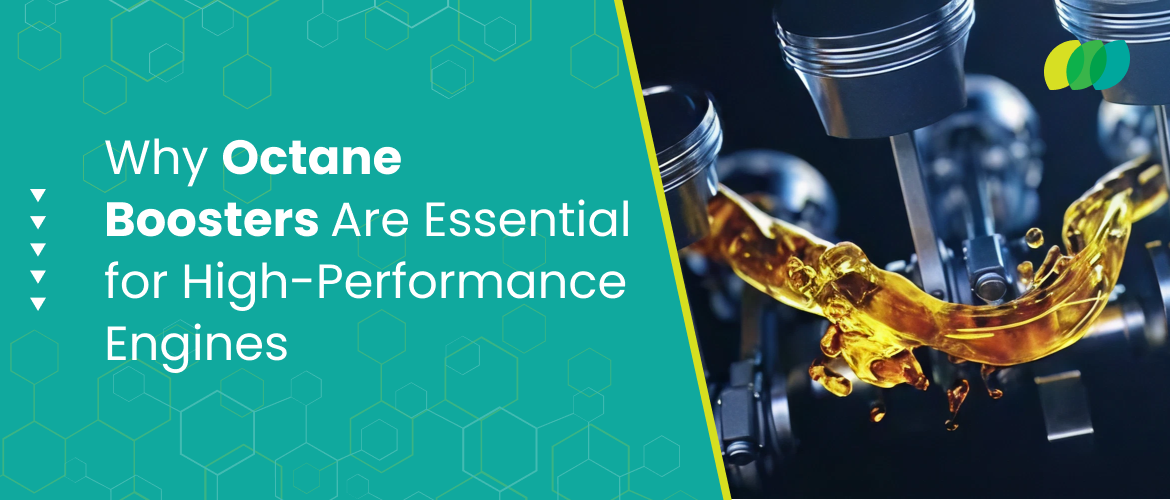High-performance engines are built for power. They are tuned to deliver more speed, sharper response, and stronger acceleration than a standard car engine. The more advanced the engine, the more sensitive it becomes to the quality of fuel it runs on. This is where octane boosters step in.
Most decision-makers in the automotive and fuel industry are already familiar with the role of octane in preventing knocking.
Let us break it down.
What Does Octane Actually Do?
When fuel detonates too early, it causes a knocking sound—more than just an irritation. Knocking puts stress on pistons, valves, and cylinder walls, leading to wear or even severe engine damage.
Octane rating tells you how resistant the fuel is to this premature combustion. The higher the octane number, the safer the engine runs under heavy stress.
Octane Boosters are chemicals that are used to increase this number. Simply stated, they provide fuel with that additional strength to sustain the harsh engine requirements.
Why Do High-Performance Engines Need More?
High-performance engines are not designed like regular commuter car engines. They run hotter. They are geared with increased compression ratios. They are pushed harder by drivers. And in many cases, the regular fuel available at the pump simply does not cut it.
Without octane boosters, such engines face:
- Reduced efficiency because the engine has to pull back timing to avoid knock.
- Higher maintenance costs due to wear and tear
- Loss of the very performance they were built to deliver.
So while a standard vehicle might manage fine without it, a high-performance engine cannot always compromise.
A Closer Look: The Role of Octane Boosters
Let us look at it from a decision-maker’s perspective. Why does this product matter for industries dealing with automotive fuels, racing, or engine maintenance? Because anytime an engine delivers top power output, the risks increase. Octane Boosters act like a safety net. They stabilize fuel performance, reduce variability, and extend the margin of safety.
It is like reinforcing a bridge that carries heavy trucks daily—without support, it weakens, but with reinforcement, it can withstand constant stress. That is what boosters do for engines.
Benefits Beyond Just Knock Prevention
Many assume octane boosters only prevent knocking, but they offer much more:
- Improved combustion stability – Helps engines run smoother under load.
- Consistent performance – Fuel behaves predictably even under high stress.
- Extended engine life – Reduced chances of parts failing prematurely
- Fuel flexibility – Allows engines to safely use lower-grade fuel when premium is unavailable.
For businesses, this translates into fewer breakdowns, greater performance reliability, and higher customer satisfaction.
How Octane Boosters Support Long-Term Reliability
One of the biggest costs for any organization that runs high-performance engines – whether in racing fleets, luxury vehicles, or industrial applications – is reliability. Frequent breakdowns cost not only money in repairs but also valuable time and brand reputation.
Octane boosters play a direct role in supporting long-term reliability by:
- Allowing engines to operate at their intended specifications without compromise.
- Reducing stress on critical engine components
- Minimizing the frequency of unexpected downtime
For decision-makers, this is more than a small technical advantage—it is a matter of risk management. A relatively small investment in maintaining fuel quality through boosters helps protect a far more valuable asset – the engine itself.
The Bigger Picture
High-performance engines represent significant investments, both in engineering and operation. Protecting that investment requires attention not only to the hardware but also to the fuel it consumes.
Fuel quality varies. Environmental conditions vary. Driving conditions vary. What stays constant is the demand placed on the engine. Octane boosters fill that gap by ensuring that, regardless of variability, the engine delivers consistent output without compromising safety or longevity.
Conclusion
The demand for octane boosters is not just about squeezing out a few extra horsepower. It concerns the protection of the performance, reliability, and efficiency of engines that are to be used on the edge.
For decision-makers, the choice is clear. Supporting high-performance engines with the right additives is not a luxury but it is a necessity now.

